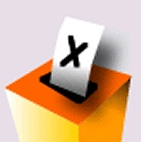 It's generally recognized that low voter turn-out reduces the quality of electoral politics in this country. Here are a couple of examples of proposals to address the problem. I think the second proposal makes a lot of sense... From an article in the NY Times by Randal C. Archibald titled "Arizona Ballot Could Become Lottery Ticket":
It's generally recognized that low voter turn-out reduces the quality of electoral politics in this country. Here are a couple of examples of proposals to address the problem. I think the second proposal makes a lot of sense... From an article in the NY Times by Randal C. Archibald titled "Arizona Ballot Could Become Lottery Ticket":
To anyone who ever said, "I wouldn't vote for that bum for a million bucks," Arizona may be calling your bluff. A proposal to award $1 million in every general election to one lucky resident, chosen by lottery, simply for voting - no matter for whom - has qualified for the November ballot. Mark Osterloh, a political gadfly who is behind the initiative, the Arizona Voter Reward Act, is promoting it with the slogan, "Who Wants to Be a Millionaire? Vote!" ... The initiative calls for financing the award through unclaimed state lottery prize money, private donations and, if need be, state money. A spokeswoman for the Arizona Lottery Commission said its unclaimed prize pot fluctuated greatly, but it now stood at more than $1 million... Passage of the initiative would supersede a state law barring any exchange of a vote for money, legal experts agreed, but whether it would get around similar federal laws was a matter of debate.
From an op-ed piece in the NY Times by Norm Ornstein titled "Vote - Or Else", a long but very interesting passage:
The unhappy effects of low turnout are clear: ever-greater polarization in the country and in Washington, which in turn has led to ever-more rancor and ever-less legislative progress. Here's why. With participation rates of about 10 percent or less of the eligible electorate in many primaries to 35 percent or so in midterm general elections to 50 percent or 60 percent in presidential contests, the name of the game for parties is turnout - and the key to success is turning out one's ideological base. Whichever party does a better job getting its base to the polls reaps the rewards of majority status. And what's the best way to get your base to show up at the polls? Focus on divisive issues that underscore the differences between the parties. Not surprisingly, the partisan divide keeps increasing. Just look at Tuesday's results: Mr. Lieberman, a centrist, was unseated by Mr. Lamont, a darling of the left; in Michigan, Joe Schwarz, a moderate Republican congressman, was beaten by Tim Walberg, a bedrock conservative. It's no wonder that when Republicans and Democrats finally arrive in Washington, there's little incentive for them to do the nation's business. So what can be done? Here's a possible solution: mandatory voting. A number of countries, including Singapore, Cyprus, Austria and Belgium, have forms of mandatory voting. But Australia, a sprawling polity like ours, provides perhaps the best example of why it bears consideration for the United States. In the Australian system, registered voters who do not show up at the polls either have to provide a reason for not voting or pay a modest fine, the equivalent of about $15. The fine accelerates with subsequent offenses. The result, however, is a turnout rate of more than 95 percent. The fine, of course, is an incentive to vote. But the system has also instilled the idea that voting is a societal obligation. It has also elevated the political dialogue. Australian politicians know that all their fellow citizens, including their own partisans, their adversaries' partisans and nonpartisans, will be at the polls. The way to gain votes does not come from working your base to fever pitch; it comes from persuading the persuadables, the centrists who are increasingly left out of the American political process. Appealing to the extremes is a formula for failure. If there were mandatory voting in America, there's a good chance that the ensuing reduction in extremist discourse would lead to genuine legislative progress. These days, valuable Congressional time is spent on frivolous or narrow issues (flag burning, same-sex marriage) that are intended only to spur on the party bases and ideological extremes. Consequently, important, complicated issues (pension and health-care reform) get short shrift. There's no question that compulsory voting would be a tough sell. Congress would have to pass a law and the states would have to enforce it. Surveys on the subject regularly show substantial majorities opposed to the idea. Americans don't like compulsory anything - we value the freedom not to vote. But going to the polls doesn't mean that you have to vote for a particular candidate. About three percent of Australians, for example, mark X on the ballot, the equivalent of "none of the above." Mandatory voting comes with a price: a modest loss of freedom. But this would be more than balanced by the revitalization of the rapidly vanishing center in American politics.